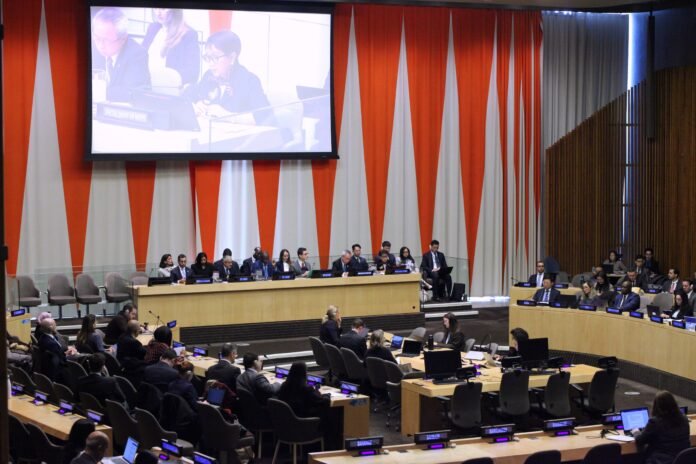Overview of the General Assembly’s Decision
In a significant move towards enhancing global water governance, the General Assembly recently reached a unanimous decision that sets the groundwork for the upcoming 2026 United Nations Water Conference. This decision identifies six key interactive dialogue themes that will frame the discussions and deliberations at the conference, highlighting the essential nature of water as a critical resource for sustainable development.
Among the themes outlined by the General Assembly, the human rights to water and sanitation stands out as a fundamental issue. This theme emphasizes the inherent right of every individual to access clean and safe water, as well as adequate sanitation. The acknowledgment of water rights is vital not only for public health but also for social equity and the protection of vulnerable populations.
Sustainable water resource management is another crucial theme that will guide the conversations at the 2026 conference. This topic invites stakeholders to examine innovative strategies and practices aimed at promoting efficient usage, conservation, and protection of water resources. As water scarcity becomes an increasingly pressing global issue, discussions surrounding sustainable management are essential for long-term viability and ecosystem health.
The importance of international cooperation is further underscored by the General Assembly’s decision. This theme focuses on collaborative approaches among nations, allowing for the sharing of best practices and technological advancements in water management. With countries facing diverse challenges regarding water resources, fostering a spirit of partnership will be imperative for effective solutions.
The roles of the United Arab Emirates and Senegal as co-hosts of the 2026 conference highlight their commitment to addressing global water issues. Their involvement underscores the importance of regional collaboration in confronting challenges related to water governance. As stakeholders prepare for the conference, these themes will serve as cornerstone principles guiding the discourse on crucial water issues worldwide.
Concerns from Member States: The United States and Argentina
The significance of the 2026 United Nations Water Conference is underscored by various member states voicing concerns regarding the adopted themes. Representatives from the United States expressed noteworthy reservations, particularly on issues that overlap with its established national policy positions. A key area of contention is the treatment of rights to water and sanitation within the conference framework. The U.S. delegation articulated the necessity for a pragmatic and environmentally focused approach to address critical water-related challenges, specifically those stemming from climate change. They emphasized the importance of prioritizing action against environmental threats, rather than an expanded interpretation of rights that might not align with national interests.
Moreover, the U.S. delegates raised issues surrounding the inclusivity of the frameworks being proposed. The call for inclusivity has implications for governance structures and decision-making processes regarding water management. This highlights a fundamental difference in approaches to the water crisis, with the U.S. advocating for solutions that align with its policy and strategic priorities, including an emphasis on water stewardship that addresses both current and future environmental concerns.
On the other hand, Argentina’s representatives introduced an additional layer of complexity by dissociating their position from references to the 2030 Agenda for Sustainable Development. Argentine officials asserted that the right to water and sanitation should primarily be perceived as a sovereign state responsibility, rather than as a global mandate. This stance reflects broader concerns regarding the interpretation of international frameworks and their applicability at a national level, raising questions about states’ agency in determining their water policies.
The implications of these reservations from both the United States and Argentina are significant. They suggest a potential fragmentation in the dialogue at the conference, where member states might prioritize differing approaches to water management grounded in their national contexts. Understanding these dynamics will be crucial as discussions unfold, potentially influencing outcomes and cooperative efforts in addressing global water challenges.
Türkiye’s Perspective on Water Cooperation
Türkiye has consistently asserted that cooperation is an essential theme in addressing global water challenges. The Turkish delegate articulated a sentiment of dissatisfaction regarding the perceived lack of a comprehensive reassessment of this theme within the United Nations’ frameworks. Concerns were raised about the risk of politicizing discussions surrounding water issues, potentially undermining opportunities for genuine collaboration among nations. This apprehension highlights an essential aspect of Türkiye’s perspective, which champions a cooperative spirit that transcends political boundaries.
Despite these concerns, Türkiye remains optimistic about the role of co-hosting nations ensuring that the theme of cooperation is handled equitably. In this context, Türkiye emphasizes that discussions should center around practical solutions that address the pressing needs of developing countries. The Turkish viewpoint is that these nations face unique challenges that require tailored approaches, particularly in terms of access to necessary resources. This perspective aligns with the broader call for equitable global dialogue regarding water-related challenges.
The focus on practical aspects such as financing, technology transfer, and capacity-building is paramount. Türkiye advocates for a discourse that prioritizes ground-level needs rather than lofty and unrealistic objectives. By enabling developing countries through funding, innovative technology, and the cultivation of local expertise, Türkiye believes that genuine progress can be achieved in water management. In aiding these nations, the international community can foster a more resilient global framework for managing shared water resources.
In conclusion, Türkiye’s advocacy for a cooperative approach to water issues emphasizes the importance of inclusivity and pragmatic solutions. As the 2026 United Nations Water Conference approaches, it is crucial to ensure that the voice of Türkiye, along with those of other stakeholders, is acknowledged in the dialogues surrounding water cooperation.
Looking Ahead: The Importance of the 2026 Conference Themes
The 2026 United Nations Water Conference presents an important opportunity to address critical global challenges related to water resources. The themes identified for this conference are a reflection of the urgent need for sustainable water management practices, which are imperative in addressing issues such as water scarcity, pollution, and equitable access. As these themes are developed and discussed, they will provide a comprehensive framework for understanding the complex dynamics that shape water governance and management on a global scale.
One significant dimension of the conference themes is their focus on inclusivity and the incorporation of diverse perspectives. The United Nations emphasizes not only the importance of unilateral state initiatives but also the collaborative efforts that involve various stakeholders, including local communities, non-governmental organizations, and the private sector. This inclusive approach is vital for ensuring that the solutions proposed are well-rounded and take into account the multifaceted nature of water-related challenges faced by different regions. As various member states have expressed their concerns, it is essential that the discussions foster an environment where all voices are heard, enabling comprehensive dialogue that can lead to effective solutions.
The outcomes of the 2026 conference may pave the way for drastic reforms in international water policy and enhance global cooperation efforts. Nations working together can share best practices and innovative technologies that address water-related issues, such as climate change adaptation and resource management. The conference serves not only as a platform for dialogue but also a catalyst for actionable commitments that can reshape how water resources are perceived and managed worldwide.
Ultimately, the themes of this conference signify a pivotal moment for international water governance, as they highlight the necessity of cooperative engagement and sustainable practices in overcoming the present-day water challenges. By prioritizing these themes, the 2026 United Nations Water Conference will help to forge a path towards more resilient, equitable, and sustainable water management strategies globally.


